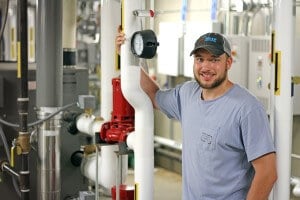 Rather than worrying about burning up on the beach, nine Arkansas engineering students are spending their summers concerned with helping state agencies burn less energy.
Rather than worrying about burning up on the beach, nine Arkansas engineering students are spending their summers concerned with helping state agencies burn less energy.
This summer marks the first year of the energy engineering summer internship program, which is sponsored by the Arkansas Industrial Energy Clearinghouse.
After only a couple of weeks recovering from the spring semester, the emerging engineers convened in Fayetteville for a three-day energy efficiency workshop. Dr. Darin Nutter, P.E., director of the Clearinghouse and professor of Mechanical Engineering at the University of Arkansas, tailored the lessons for each student to prepare them for their summer experience.
Among the selected interns for this program is Justin Vanhoose, a third-year engineering student at Southern Arkansas University in Magnolia. His mission is to survey all of SAU’s facilities, going into each room of each building, to add up the amount and type of lighting being used.
“This experience has been a really good affirmation that this is the career path I want to be on,” said Vanhoose. “My supervisors are always there to direct me when I need it, but I’ve been allowed to solve problems and think on my own.”
In extrapolating the cost of the second and third floors of SAU’s Magale Library alone, Vanhoose discovered the cost savings if the more than 1,100 florescent bulbs were changed to LED.
SAU’s Vice President for Facilities Jasper Lewis sees this energy internship program as a “win-win” for all involved, with students being trained on equipment and techniques while promoting energy awareness and good stewardship of public funding. He’s sees Vanhoose’s work contributing to the continuation of SAU’s long and proud tradition of being among the most energy efficient organizations at the national level.
“Justin is an outstanding student whose talents are demonstrated on a daily basis. He has already made significant progress towards identifying ways to save energy and reduce cost through advanced equipment and management techniques,” said Lewis.
He and the other interns work approximately 35 hours a week and submit a weekly journal to Nutter. At the completion of the 10-week internship, each will complete a final report about what was learned and the energy efficiency measures that were recommended or implemented.
This summer’s energy interns represent the following Arkansas universities: Arkansas State University, Arkansas Tech University, Southern Arkansas University, University of Arkansas – Fayetteville, University of Arkansas – Fort Smith and University of Arkansas – Little Rock.
According to Nutter, the objectives are the same for each intern. The student benefits from hands-on energy efficiency related experience while they provide much needed help to state agencies in their energy efficiency improvement efforts, including Act 1494 that passed in 2009.
Looking further ahead, Nutter hopes this internship program will help infuse Arkansas with engineering graduates that are equipped to improve the state’s economy and sustainability through energy efficiency.
In line with cultivating future engineers, SAU’s Engineering program is hosting an inaugural “Big Bang Engineering Summer Camp” on July 20-22, 2015. High school students, grades 9-12, who want to work hands-on with projects relating to engineering and physics are encouraged to register at https://web.saumag.edu/big-bang-camp. Cost is $200, which covers all room and board. Applications must be submitted by July 7.
Since 2010, the Arkansas Industrial Energy Clearinghouse has been housed at the University of Arkansas’s Mechanical Engineering Department located in Fayetteville, Arkansas. Its function is to support and promote energy efficiency within Arkansas. Although primary interaction has been with the industrial manufacturing sector, they have recently included the intern program to target state agencies and institutions.
“Jasper Lewis and everyone at SAU have been very cooperative, supportive, and wonderful to work with this summer,” said Nutter. “I am privileged, as an engineering professor at UofA, to support the state of Arkansas, support the growth of our engineering workforce, and establish relationships between Arkansas universities.”
